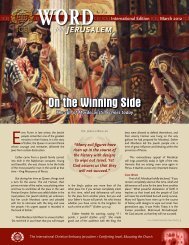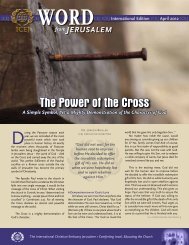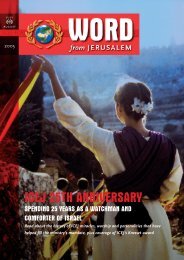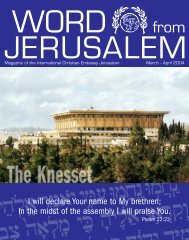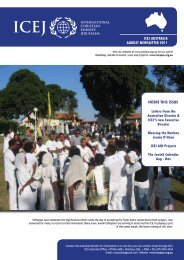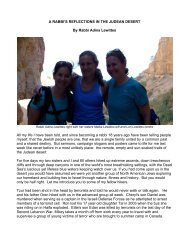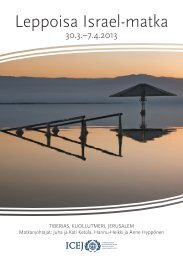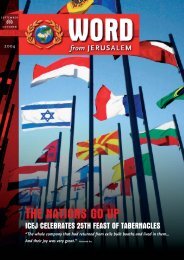WORD
Battling the Blaze - International Christian Embassy Jerusalem
Battling the Blaze - International Christian Embassy Jerusalem
- No tags were found...
Create successful ePaper yourself
Turn your PDF publications into a flip-book with our unique Google optimized e-Paper software.
<strong>WORD</strong><br />
ICEJ ICEJ ICEJ ICEJ ICEJ ICEJ ICEJ ICEJ ICEJ ICEJ International Edition ICEJ January 2011 ICEJ<br />
ICEJ<br />
from JERUSALEM<br />
Battling the Blaze<br />
Providing emergency relief for those impacted by the Carmel fires<br />
The Carmel forest fires which<br />
broke out near Haifa in early<br />
December were quickly labeled<br />
the worst natural disaster in<br />
Israel’s modern history and the toll<br />
in terms of lost lives, resources and<br />
habitat was staggering. By the time the<br />
flames were finally extinguished four<br />
days later, the wildfires had claimed 42<br />
lives, damaged or destroyed 250 homes,<br />
and consumed some 12,500 acres of the<br />
nation’s most treasured woodlands.<br />
The tragedy was compounded in the<br />
first hours of the blaze when 36 trainee<br />
Smoke Trails over Haifa<br />
The Carmel forest fires seen from high<br />
above the Haifa port. (AP photo)<br />
By David Parsons<br />
ICEJ Media Director<br />
“As the funds poured in<br />
from across the world<br />
we were able to assist in<br />
opening up the Haifa Home<br />
for Holocaust Survivors as<br />
an emergency shelter”<br />
prison guards were sent to evacuate an<br />
endangered prison but died when rapidly<br />
spreading flames engulfed their bus. By<br />
nightfall of the first day, Israeli officials<br />
admitted they were unable to contain the<br />
wildfire and appealed for international<br />
assistance.<br />
The International Christian Embassy<br />
Jerusalem joined in this appeal by asking our<br />
friends and supporters worldwide to donate<br />
towards the rescue and recovery efforts.<br />
As the funds poured in from across<br />
the world we were able to assist Yad<br />
Ezer L’Haver, our Israeli charitable partner<br />
in establishing the new Haifa Home for<br />
Holocaust Survivors, to open up the facility<br />
as an emergency shelter for hundreds of<br />
area residents forced to evacuate their<br />
homes.<br />
With our help, Yad Ezer also opened a<br />
crisis center in Tirat Karmel to provide food,<br />
clothing, shelter, childcare and medical aid<br />
to those affected by the fires.<br />
>> continued on back page<br />
Battling the Blaze<br />
Israeli firefighters battle the worst<br />
wildfires in the nation’s history on the<br />
Carmel range last month. (AP photo)<br />
The International Christian Embassy Jerusalem • Comforting Israel, Educating the Church
The International Christian<br />
Embassy Jerusalem<br />
Director’s Letter<br />
Dear Friends,<br />
The International Christian<br />
Embassy Jerusalem was founded in 1980<br />
as an act of comfort and solidarity with<br />
Israel and the Jewish people in their claim<br />
to Jerusalem.<br />
Today, the Christian Embassy stands<br />
at the forefront of a growing mainstream<br />
movement of Christians worldwide who<br />
share a love and concern for Israel and an<br />
understanding of the biblical significance<br />
of the modern ingathering of Jews to the<br />
land of their forefathers.<br />
From our headquarters in Jerusalem and<br />
through our branches and representatives<br />
in over 80 nations, we seek to challenge<br />
the Church to take up its scriptural<br />
responsibilities towards the Jewish people,<br />
to remind Israel of the wonderful promises<br />
made to her in the Bible, and to be a source<br />
of practical assistance to all the people of<br />
the Land of Israel.<br />
The ICEJ is a non-denominational<br />
faith ministry, supported by the voluntary<br />
contributions of our members and friends<br />
across the globe. We invite you to join with<br />
us as we minister to Israel and the Jewish<br />
people worldwide by using the enclosed<br />
response slip to make your donation to the<br />
ongoing work and witness of the ICEJ.<br />
As we enter a new year, it is appropriate to look back and<br />
give thanks to God for all that we have achieved together in<br />
2010. Not only have we discharged the day-to-day work of<br />
standing with Israel and comforting her, but we have also taken<br />
on some challenging projects like helping to send Israeli relief<br />
agencies and medical teams to Haiti, supplying portable bombshelters<br />
to the threatened towns of southern Israel, and greatly<br />
expanding a home in Haifa for poor Holocaust Survivors.<br />
As always, the Feast is a huge event with an impact that is always positive and<br />
comforting to Israelis. Year after year, they are assured that they are not alone and have<br />
true and faithful friends throughout the earth. In some respects I could go on and on,<br />
but the truth is the Lord has helped us to fulfil His call and mandate over our ministry.<br />
We desire to please Him and do His will. Time and time again in our deliberations,<br />
we have stopped to pray and wait upon Him so that we could be sure of harmonizing<br />
our plans with His. It can be so easy to press on as usual assuming that God is blessing<br />
what we are doing. It is, in fact, the other way around! We are always mindful of this.<br />
So as we enter 2011, I know that we will have even greater challenges and needs to<br />
meet in Israel. I personally think that difficult times are ahead in Israel and all over the<br />
world. I feel that the Spirit of God is warning me about this. We must prepare and we<br />
must keep our eyes upon Jesus. We have no need to fear or panic. That is the business<br />
of the world. Our confidence and peace is found in the God of Israel, Who indeed is<br />
shaking all things!<br />
We have much work to do for Him and we are ready to serve. This we can only do<br />
with you and I want to thank you for always standing with us.<br />
In Jesus,<br />
May you know and love the Lord God of Heaven more and more in 2011.<br />
Rev. Malcolm Hedding<br />
ICEJ Executive Director<br />
INTERNATIONAL CHRISTIAN<br />
EMBASSY JERUSALEM<br />
P.O. Box 1192<br />
Jerusalem • 91010, ISRAEL<br />
Support our ministry online at:<br />
www.icej.org
CHRISTMAS 2010 <strong>WORD</strong> FROM JERUSALEM 3<br />
ICEJ Christmas & Hanukkah Outreach<br />
Reaching out to needy Arab and Jewish families throughout the Holy Land<br />
By Estera Wieja<br />
During the Hanukkah and<br />
Christmas seasons this past<br />
December, the ICEJ reached<br />
out to needy Jewish and<br />
Arab families throughout the Holy Land<br />
as a testimony to the heavenly “light”<br />
celebrated at this unique time of year.<br />
During Hanukkah, the Embassy’s social<br />
assistance arm - ICEJ AID - sponsored<br />
holiday festivities for several needy<br />
Jewish communities, reaching out to<br />
underprivileged and abused children and<br />
the elderly.<br />
Then, as Christmas neared, we<br />
stepped in to sponsor a number of<br />
assistance projects among the Arab<br />
Christian community, including the largest<br />
Christmas party in Bethlehem, hosted<br />
each year by the First Baptist Church of<br />
Bethlehem. We also provided Christmas<br />
gifts to several hundred Arab children<br />
from Bethlehem and Jericho.<br />
Using our contacts with local Arab<br />
Christian ministries, the ICEJ AID team<br />
were able to provide needy Lebanese<br />
refugee families in the Galilee with food<br />
coupons for the holidays, while poor Arab<br />
Christian families in Nazareth received<br />
food as well.<br />
This Christmas, ICEJ AID also<br />
partnered with charitable ministries in<br />
the Old City of Jerusalem so that several<br />
hundred elderly Arab believers living in the<br />
Christian Quarter could experience firsthand<br />
care for the holidays, including gifts<br />
and blankets for each.<br />
With the onset of winter, ICEJ AID<br />
will now focus on making sure the more<br />
vulnerable segments of society have the<br />
warmth and shelter they need to face<br />
the cold weather. Our efforts include the<br />
distribution of blankets and heaters to new<br />
immigrants, the elderly, poor families and<br />
others in dire need.<br />
Support Ongoing ICEJ AID Projects in Israel: www.icej.org/donate.php
4 <strong>WORD</strong> FROM JERUSALEM SPECIAL PROJECTS<br />
The Yardenit ‘Wall of New Life’<br />
ICEJ honoured for multilingual Bible project at world-famous baptismal site<br />
By Estera Wieja<br />
The Yardenit baptismal site near the Sea of Galilee, one of<br />
Israel’s most popular tourist venues, recently honoured<br />
the International Christian Embassy Jerusalem<br />
for sponsoring its Wall of New Life, which<br />
features beautiful Armenian tile renditions in<br />
nearly 40 languages of the Gospel of Mark’s<br />
account of the baptism of Jesus.<br />
Kibbutz Kinneret, Israel’s second<br />
oldest kibbutz, established the Yardenit<br />
baptismal site some 30 years ago on<br />
a branch of the Lower Jordan River as<br />
it flows out of the south end of the Sea<br />
of Galilee. The serenity of the location<br />
readily invited visitors back to that moment<br />
when Jesus began his public ministry by entering<br />
the waters of baptism in the same Jordan river. The site<br />
quickly became a “must” stop for Christian pilgrims to the Holy<br />
Land, and today it draws nearly one million visitors per year.<br />
Yardenit’s managers were especially moved over the years by<br />
their encounters with friendly, exuberant evangelical Christians,<br />
who have become the main focal point of their marketing<br />
“Yardenit is a special<br />
place for evangelical<br />
Christians, where they<br />
can follow their Saviour<br />
through the waters of<br />
baptism”<br />
efforts. While most Bible sites in Israel frequented by Christians<br />
are owned and maintained by the Catholic or Greek Orthodox<br />
churches and thus cater primarily to their followers,<br />
Yardenit is unique in the welcoming atmosphere<br />
it offers to Evangelicals. The Israel Ministry<br />
of Tourism has also given the site much<br />
emphasis in its promotional materials.<br />
For these reasons, the Christian<br />
Embassy was pleased to have the<br />
opportunity to establish a “presence” at<br />
this popular site through the Wall of New<br />
Life project. The ICEJ’s Executive Director,<br />
Rev. Malcolm Hedding, and International<br />
Director Dr. Jürgen Bühler were recently<br />
invited to take part in a ceremony dedicating a plaque<br />
along the Wall which honors the International Christian<br />
Embassy Jerusalem for sponsoring the project.<br />
The Wall is designed to be a significant feature at Yardenit,<br />
beginning at the entrance to the facility and continuing along the<br />
banks of the Jordan to the baptismal pools. It conveys a powerful<br />
and welcoming message, as most visitors from various nations
YARDENIT WALL OF LIFE <strong>WORD</strong> FROM JERUSALEM 5<br />
around the globe are able to read the account of Jesus’ baptism from<br />
Mark 1:9-11 in their native languages.<br />
In those days Jesus came<br />
from Nazareth of Galilee and<br />
was baptised by John<br />
in the Jordan.<br />
And when he came up out<br />
of water, immediately he saw<br />
the heavens opened and<br />
the Spirit descending upon him<br />
like a dove, and a voice<br />
came from heaven;<br />
“Thou art my beloved Son,<br />
with thee I am well pleased.”<br />
BAPTISMAL DEDICATION: ICEJ Executive Director Rev. Malcolm<br />
Hedding and International Director Dr. Jürgen Bühler unveil a<br />
plaque honoring the ICEJ at Yardenit. (photo courtesy Yardenit)<br />
The Wall is dedicated to Christians throughout the world who<br />
have been baptized at the site, and consists of some 40 panels<br />
of beautifully hand-painted tiles created by noted Armenian<br />
artist Hagop Antreassian from Jerusalem’s Old City. Each panel<br />
presents the same baptismal verses from Mark in a different<br />
language, ranging from tribal tongues of Africa to prevalent<br />
European languages and unique Asian scripts.<br />
At the dedication, Hedding described Yardenit as “a special<br />
place for evangelical Christians, where the spiritual dreams of<br />
millions of Bible-believing Christians have come true. To follow<br />
their Saviour, the Lord Jesus Christ, through the waters of<br />
baptism and to be able to do so in the flowing waters of River<br />
Jordan is a supernatural experience.”<br />
“We appreciate that you’ve done something this unique”,<br />
Hedding told the Yardenit leadership. “I think by this particular<br />
facility you have also made a great contribution in Jewish-<br />
Christian relations. The fact that Israelis would build a baptismal<br />
site for Christians – it’s quite astonishing.”<br />
Rev. Hedding was also invited to plant an olive tree in the<br />
Yardenit gardens in his name as a memorial to his efforts in<br />
building closer Christian ties to Israel over recent decades..<br />
Estera Wieja serves as a staff writer for the ICEJ media team in Jerusalem and a contributor to The Jerusalem Post Christian Edition
6 <strong>WORD</strong> FROM JERUSALEM<br />
Opening the Way<br />
Ruppin Academic Center developing Ethiopian Jewish leaders of the future<br />
By Shallé McDonald<br />
In 1993, a 14-year old Jewish orphan named<br />
Solomon trekked alone from Ethiopia to<br />
Israel. His mother had died in Ethiopia<br />
while his father – who immigrated two<br />
years earlier during Operation Solomon<br />
– had died in Israel. How could such<br />
a frightened young man from a small<br />
village, stripped of family support,<br />
immigrate to a modern society with a<br />
different language and culture and then<br />
rise to become an outstanding college<br />
student with his own family?<br />
Solomon started out the absorption process in Israel<br />
like many Ethiopian Jews his age — at a religious boarding<br />
school. After high school, Solomon completed his IDF service, but<br />
found himself facing yet another tough moment in his young life.<br />
“I needed to do my own fight, to grow up alone, look for a<br />
job and pay rent—all alone. I didn’t even know how to look for a<br />
job”, said Solomon.<br />
The ICEJ is sponsoring<br />
scholarships for Ethiopian<br />
students like Solomon,<br />
so they can impact their<br />
community and Israeli<br />
society as a whole.<br />
Solomon said he had always wanted to study and<br />
be successful, but without money for studies due<br />
to his low-paying work, he was not able to<br />
begin university when most young Israelis<br />
do. Around age 27, he first heard of the<br />
leadership program for Ethiopian Jews<br />
run by the Ruppin Academic Center near<br />
Netanya. He could earn a Bachelor’s<br />
degree in Business Administration with a<br />
specialisation in Immigration and Social<br />
Integration with an eye to helping other<br />
Ethiopian newcomers, all while receiving a<br />
full scholarship and benefitting from an extensive<br />
network of support.<br />
Essentially the program, which is the first of its kind in Israel,<br />
seeks to develop role models who can mediate between the<br />
Ethiopian community and Israeli society at large, helping to break<br />
down barriers of social and economic integration. The program<br />
includes participation in hands-on volunteer projects and postdegree<br />
assistance for entering the job market.
OPENING THE WAY <strong>WORD</strong> FROM JERUSALEM 7<br />
Solomon was excited to learn of the program, since he knew<br />
many young Ethiopian Jews like himself who simply felt helpless<br />
about achieving a successful career due to the unique hardships<br />
they face. One such challenge is passing the Israeli university<br />
entrance exams, which are culturally geared for those born into<br />
Israeli society.<br />
“Besides socio-economic issues, young Ethiopians have<br />
difficulty passing the test because it is culturally-based — so we<br />
offer a prep course that enables them to go on to higher academic<br />
studies”, said Revital Poleg, a development director at Ruppin.<br />
Solomon began connecting with the Ethiopian community<br />
from the moment he began studying at Ruppin, as a volunteer at<br />
a special center for at-risk youths in Tel Aviv.<br />
“On my very first day at the center, we found one young guy<br />
that was running away”, he recalled. “This was my first day, but<br />
suddenly I found myself knowing that I have to take the lead.<br />
We knew nothing about this guy, so I made some calls in the<br />
community. I found out that he ran away from home and we<br />
found the family. It gave me a special feeling that I can really<br />
contribute a lot to my community.”<br />
Another semester he volunteered at absorption centers,<br />
which showed him how important it is for absorption workers in<br />
Israel to understand new immigrants.<br />
“I remember my first days in Israel when they put me in an<br />
absorption center, in an elevator going to the 9th floor. I never<br />
saw such floors in my life because I grew up in a village. It was all<br />
ground level and suddenly I’m on the 9th floor — I didn’t even<br />
know how to go down”, Solomon said with a chuckle.<br />
“What I do is a mission. The main thing I received at Ruppin<br />
is that it brought me to a better understanding of my community<br />
and how to help them be more connected”, he said.<br />
Solomon now wants his own family to succeed, and he hopes<br />
to work for the Israeli government on behalf of Ethiopian Jewry.<br />
The ICEJ is sponsoring scholarships for Ethiopian students<br />
like Solomon to attend the Ruppin Academic Center, making it<br />
possible for them to excel and make a profound impact not only<br />
in their own community, but also in Israeli society as a whole.<br />
Please consider making a gift to this special project today.<br />
Shallé McDonald served as a staff writer for the ICEJ media team<br />
and a contributor to The Jerusalem Post Christian Edition<br />
Students in the Ruppin Academic Center’s<br />
special program for Ethiopian Jews .<br />
(Ruppin Academic Center)<br />
Painful Journey; Bright Future<br />
ICEJ Project Update<br />
Making aliyah has been fraught with difficulties for<br />
Ethiopian Jews, many of whom fled their famine ravaged<br />
homeland in the early 1980s by treking across Africa’s<br />
Nubian Desert on foot. It was a journey that saw only 2<br />
out of 3 make it to Israel alive. For those that survived new<br />
challenges awaited them in Israel as they struggled to adapt<br />
to the culture, lifestyle and advanced technology of a First<br />
World nation.<br />
This past year ICEJ AID has been focusing on the<br />
needs of this unique community: increasing educational<br />
opportunities for young Ethiopians on one hand while<br />
assisting the older generations deal with the painful<br />
memories of their journey nearly 30 years ago.<br />
Today some 70% of Ethiopian Jews live below the<br />
poverty line. To break the employment barrier, however,<br />
this community needs help bridging the education gap.<br />
That’s why the ICEJ has been partnering with the Ruppin<br />
Academic Center near Netanya in its efforts to enable more<br />
second-generation immigrants to gain higher education<br />
qualifications.<br />
We’ve also been supporting a successful after-school<br />
program in Bet Shemesh that provides a safe place for<br />
at-risk Ethiopian teens to get help with behavioural and<br />
educational problems and complete their High School<br />
education. So far not one of those in the program has<br />
dropped out of school!<br />
In addition ICEJ AID is continuing to support the<br />
Israel Center for the Treatment of Psychotrauma at<br />
Herzog Hospital as it seeks to assist an older generation<br />
come to terms with the trauma of their historic, yet painful<br />
desert journey.<br />
With our help, the center is providing one-on-one<br />
counseling and group therapy to enable these precious<br />
survivors finally to tell their story and begin to address<br />
the high rate of suicide and depression prevalent in their<br />
community.<br />
None of this would be possible without the ongoing<br />
prayers and financial sacrifice of Christians around the<br />
world. Thank you for your faithful support!<br />
Support ICEJ Aid Projects in Israel<br />
www.icej.org/donate.php
10 <strong>WORD</strong> FROM JERUSALEM BIBLE TEACHING<br />
Israel and Fulfilment Theology<br />
If Jesus came and birthed the Church, is there still a role for the Jewish nation?<br />
David Parsons<br />
While most evangelical Christians are supportive<br />
of Israel’s modern-day restoration, there is a<br />
growing movement among Evangelicals which is<br />
sympathetic to Palestinian suffering and claims to<br />
statehood. To provide a biblical basis for their position, many<br />
Evangelicals have turned to the trendy new answer of Fulfilment<br />
theology. This is a biblical outlook which sees natural Israel as<br />
having already “fulfilled” her redemptive purpose with the coming<br />
of Christ and the birth of the Church, leaving the Jewish nation<br />
with no future role to play. Adherents place much emphasis on<br />
the ever-expanding “inclusiveness” of God’s salvation plan as it<br />
culminated in the Gospel being preached to all nations.<br />
In a sign of just how prevalent this view has become, it was<br />
endorsed at the course-setting Third Lausanne Conference on<br />
World Evangelization in October 2010.<br />
Now the universal nature of God’s intended family is such<br />
an elemental truth that no Christian can rightly contest it.<br />
Yet some are presenting this inclusiveness as if it were some<br />
new or deeper revelation. But when God first called Abraham<br />
into redemptive service, He was not exactly ‘hiding the ball’.<br />
Rather, God stated quite clearly that His ultimate purpose was<br />
to “bless all the families of the earth” (Genesis 12:1-3).<br />
On the other hand, the Apostle Paul tells us there is a certain<br />
enduring “mystery” about natural Israel that has survived the<br />
Cross and the birth of the Church. So while Fulfilment theology<br />
makes some valid points, it is not the full counsel of Scripture.<br />
That is to be found in Covenant theology.<br />
Covenant Theology – The Story of Salvation<br />
The great covenants of the Bible actually tell the story of<br />
God’s salvation plan, beginning with the calling of Abraham.<br />
God’s covenant with Abraham is the foundation upon which<br />
all successive covenants are built, from Moses to David to<br />
the New covenant. Each was built upon or “added to” prior<br />
covenants and did not abrogate or nullify any preceding one<br />
(Galatians 3:16-19).<br />
In the Abrahamic covenant, God offers His grace and<br />
salvation to “all the families of the earth” through faith in Him.<br />
But the world did not know it was in need of redemption, so in
BIBLE TEACHING <strong>WORD</strong> FROM JERUSALEM 11<br />
the Mosaic covenant the Ten Commandments were given to tell<br />
us we are sinners. Thus, Paul says, “the law was our tutor to bring<br />
us to Christ” (Galatians 3:24).<br />
Under the Davidic covenant, we are assured of a King from<br />
David’s lineage who will be the Righteous Judge of the whole<br />
earth, applying the grace and law of God justly.<br />
In the New Covenant, the atoning sacrifice of Jesus enables<br />
Gentiles to be “adopted” as “sons of Abraham” and “heirs of the<br />
promise” of blessing (salvation) made to him (Romans 4:1-16;<br />
Galatians 3:6-14, 29).<br />
The sinless life of Jesus also satisfied the just requirements<br />
of the Mosaic law (Romans 3:21-26; 1 Peter 3:18). His perfect<br />
obedience to the Father, even to the point of a cursed death on<br />
a tree, earned Him the right to ascend to the throne of David<br />
as Judge of the whole earth (Psalm 110; Ephesians 1:15-23;<br />
Philippians 2:5-11; Hebrews 5:5-10).<br />
Israel’s Calling – Custodian of World Redemption<br />
Now all of this was accomplished in and through natural Israel.<br />
In fact, Paul describes this phenomenon using words that denote<br />
possession or ownership.<br />
It may come as a surprise to some Gentiles, but this is<br />
even true for the “new covenant”, which was established<br />
by Jesus with twelve Jewish disciples gathered for the Last<br />
Supper. Even the New Testament Church was birthed through<br />
120 Jews gathered on the Day of Pentecost in that same<br />
Upper Room.<br />
Thus, Paul bases his “mystery” in Romans 11:25 upon this<br />
understanding of natural Israel’s irrevocable covenant relationship<br />
with God, which is still working out His redemptive plan in the<br />
earth even through their unbelief. What he essentially says there<br />
is that so long as natural Israel rejects their Messiah, there is still<br />
time for Gentiles to get saved.<br />
Fulfilment Theology and the Davidic Covenant<br />
We also have the preaching of Peter in Acts 3:17-21, where<br />
he states that all the prophecies concerning the things Messiah<br />
must suffer have indeed been “fulfilled”, but that there are<br />
still many other things spoken by the mouths of the prophets<br />
concerning the “restoration” of Israel which are still to come.<br />
This refers to the prophetic promises regarding Israel’s physical<br />
restoration to the Land in unbelief and then their spiritual<br />
restoration to God and His Messiah in the last days (see, e.g.,<br />
Jeremiah 31, Ezekiel 36, and Hosea 5-6).<br />
In Romans 9:3-5, for instance, he explains<br />
that the covenants “pertain to” or “belong<br />
to” his fellow Israelites in the flesh. Earlier<br />
in Romans 3:1-4, he insists that the very<br />
oracles of God were “committed” or<br />
“entrusted” to natural Israel.<br />
Finally, we can note the words of Jesus<br />
himself, who told the Samaritan woman<br />
that “salvation is of the Jews” (John 4:22).<br />
These are all possessive terms used to describe<br />
the unique covenant relationship which God established<br />
with ancient Israel. They were entrusted with the means by which<br />
the world could come to salvation. God called Israel into a trust<br />
relationship, with the beneficiary being the world. Even title to the<br />
Land of Israel was vested in Abraham’s progeny in the nature of a<br />
trust so that Israel could become a nation which over time might<br />
birth into the world all the things we need for salvation.<br />
Yet in serving this unique birthing role, the people of Israel<br />
were called to be suffering servants, even to the point of being<br />
hardened by God towards their own promised Messiah. Paul<br />
tells us that this was all for the sake of the Gentiles, with the<br />
expectation that we should be grateful for it (Romans 11).<br />
So God called natural Israel in order to birth spiritual Israel –<br />
that is, the one, ever-expanding household of the redeemed. We<br />
Gentile believers do not replace natural Israel, we enlarge spiritual<br />
Israel (Galatians 6:16; Ephesians 2:11-13).<br />
Now consider that each of these great biblical covenants was<br />
established with natural Israel. God has always worked out his<br />
salvation plan for the world through natural Israel, using their<br />
belief and their unbelief in equal measure to produce the one<br />
family of the redeemed from the earth.<br />
“So God called natural<br />
Israel in order to birth<br />
spiritual Israel - that is<br />
the one, ever-expanding<br />
household of the<br />
redeemed”<br />
Jesus as well alludes to this future<br />
“regeneration” of natural Israel in Matthew<br />
19:28, when his disciples will “sit on<br />
twelve thrones, judging the twelve tribes<br />
of Israel”. (See also Luke 13:35).<br />
These passages all have to do with<br />
the future timing and fulfilment of the<br />
Davidic covenant, when Christ – as<br />
the “Son of David” – will take up his<br />
throne in Jerusalem, to rule over the earth in<br />
righteousness and peace. And since the covenants<br />
were entrusted to natural Israel and always find their<br />
outworking through them, this means that the Jewish people<br />
still have a redemptive role to fulfil for the benefit of the<br />
world.<br />
Plainly stated, the modern-day restoration of Israel is<br />
destined to birth the world into the Messianic Age in fulfilment<br />
of the Davidic covenant. In this process, natural Israel will be<br />
merged with spiritual Israel and will finally enter the rest and<br />
peace in the Land that was promised to her by God.<br />
This may frustrate some Christians, as it takes certain matters<br />
out of their hands. We Evangelicals think that if we will only preach<br />
the Gospel in all nations, then “the end will come” (Matthew<br />
24:14). This is true, but it is equally true that natural Israel still<br />
has a redemptive role to play. We need to understand and identify<br />
the out-workings of this redemptive process and to pray that it be<br />
hastened in our day. In the meantime, this demands that we show<br />
respect for natural Israel as still elect of God, even in their unbelief<br />
(Romans 11:1, 11, 29).<br />
David Parsons is ICEJ Media Director and Contributing<br />
Christian Editor of The Jerusalem Post Christian Edition.<br />
He lives with his wife and son in Jerusalem.
8 <strong>WORD</strong> FROM JERUSALEM SERVING THE NATION<br />
ICEJ sponsors students at Ariel University<br />
College reduces social divisions, but politics hinders the awarding of scholarship funds<br />
Elhanan and Rotem are both hoping to<br />
benefit from the scholarship funds which<br />
the ICEJ recently gave to Ariel University.<br />
(ICEJ/Estera Wieja)<br />
By Estera Wieja<br />
The University of Ariel has grown from a small college<br />
established in 1982 to a full-fledged university playing<br />
an important role in strengthening the bond between<br />
Israel’s young generation and their ancient heritage and<br />
values. But in recent years, the school’s application for official<br />
university status became entangled in the global delegitimization<br />
campaign against Israel, due to its location in a large community<br />
over the pre-1967 armistice lines – i.e., the West Bank.<br />
The city of Ariel and the university it hosts are both being unfairly<br />
targeted by academic, artistic, economic and other boycotts. This<br />
despite the fact that the university, for instance, is known for the<br />
wide diversity of its growing enrolment, which includes a broad<br />
mix of Jews and Arabs, Russian and Ethiopian immigrants, native<br />
Sephardim and newcomers from Western countries, all with equal<br />
access to its excellent academic programs. Stroll around campus<br />
and you will see Muslim girls browsing in Jewish shops, while<br />
Ethiopian Jews dine with Palestinian Arabs.<br />
Still, even within Israel some foundations refuse to support<br />
its students because the campus is located beyond the “Green<br />
Line”. In response, the International Christian Embassy Jerusalem<br />
decided to contribute to a scholarship fund at Ariel University<br />
which will make a difference in the lives of a number of students<br />
by providing them with financial support needed to continue<br />
their educational pursuits. The funds will help over one hundred<br />
and thirty students, many from families evacuated in the 2005<br />
Disengagement from Gush Katif in Gaza.<br />
“Thanks to the ICEJ some of our students can get scholarships<br />
they deserve, but were never offered, because the university they<br />
attend is in Samaria”, said Eldad Halachmi of the Ariel University<br />
Center (AUC). “They deserve the support no less than a student<br />
in Tel Aviv or Haifa.”<br />
“We take pride in reducing the gaps in the society of Israel.<br />
We want all our students to get a better chance in life”, said<br />
Elinor Einat, Dean of Students, who also notes the school has<br />
the largest number of Ethiopian students of any university in<br />
Israel.<br />
One of the students applying for the ICEJ scholarship is<br />
Elhanan. Outside of being a student, he is also a husband and<br />
father of two children. He is studying Industrial Engineering<br />
and Marketing, but often finds himself unable to commit the<br />
necessary time to focus on his studies due to work and family<br />
demands. “A scholarship would really help me devote more time<br />
to studying, but it would also give me a chance to spend more<br />
time with my family”, said Elhanan.<br />
Rotem, another student hoping to receive a grant, is very<br />
precise about his future plans. “I study social work, so I can join<br />
the Israeli Air Force to assist people. As a professional in my field,<br />
I believe I could be of great help to the army.”<br />
Estera Wieja serves as a staff writer for the ICEJ media team in<br />
Jerusalem and a contributor to The Jerusalem Post Christian Edition
YOUR EMBASSY IN<br />
YOUR JERUSALEM<br />
EMBASSY IN<br />
STANDING WITH ISRAEL FOR 30 YEARS<br />
JERUSALEM<br />
STANDING WITH ISRAEL FOR 30 YEARS<br />
th<br />
INTERNATIONAL CHRISTIAN<br />
JERUSALEM<br />
th<br />
ANNIVERSARY<br />
EMBASSY<br />
INTERNATIONAL CHRISTIAN<br />
EMBASSY<br />
ANNIVERSARY<br />
JERUSALEM<br />
BRINGING JEWS HOME<br />
BRINGING<br />
SERVING<br />
JEWS<br />
THE<br />
HOME<br />
NATION<br />
SERVING THE NATION<br />
CELEBRATING THE FEAST<br />
CELEBRATING THE FEAST<br />
TELLING ISRAEL'S STORY<br />
TELLING ISRAEL'S STORY<br />
REPORTING THE TRUTH<br />
REPORTING THE TRUTH<br />
DEFENDING ISRAEL<br />
DEFENDING WORLDWIDE ISRAEL<br />
WORLDWIDE<br />
Since 1980 the International Christian Embassy Jerusalem<br />
Since has stood 1980 the at International the forefront Christian of a growing Embassy Jerusalem mainstream<br />
has movement stood at of the Christians forefront worldwide of a growing who share mainstream a love and<br />
movement concern for of Israel Christians and an worldwide understanding who share of a the love biblical and<br />
concern signifigance for Israel of the and modern an understanding ingathering of of the Jews biblical to the<br />
signifigance<br />
land of their<br />
of<br />
forefathers.<br />
the modern ingathering of Jews to the<br />
land of their forefathers.<br />
www.icej.org<br />
www.icej.org<br />
PO Box 1192 Jerusalem 91010 ISRAEL<br />
PO Box 1192 Jerusalem 91010 ISRAEL
BATTLING THE BLAZE <strong>WORD</strong> FROM JERUSALEM 8<br />
>> continued from page one<br />
TORAH PROCESSION - A young Jewish boy holds the newly<br />
donated Torah scroll as it is carried through the streets<br />
of Haifa to the Home for Holocaust Survivors<br />
( ICEJ/Matthias Guggisberg)<br />
Our emergency response to the devastating fires came at the<br />
end of a year of intensive engagement with the wider community<br />
in the large Israeli port city of Haifa. And it went far beyond<br />
providing temporary shelter, school supplies or clothes for the<br />
children of displaced families.<br />
Since last January, the ICEJ has invested more<br />
than $750,000 to help impoverished Holocaust<br />
survivors in the city with the purchase and<br />
renovation of two adjacent apartment buildings<br />
that now house Yad Ezer’s assisted-living home.<br />
Thus, just weeks before the arid conditions and<br />
unseasonable heat combined to fuel the raging fires<br />
in the Carmel forest, ICEJ staff were in Haifa once more to<br />
participate in a joyous ceremony dedicating a new Torah scroll and<br />
synagogue room at the facility.<br />
A number of government officials and rabbinic authorities were<br />
on hand for the occasion, as residents of the ICEJ-funded facility<br />
celebrated the receiving of a Torah scroll and completion of the<br />
one-room synagogue just off the Home’s main dining hall.<br />
“Our emergency<br />
response to the Carmel<br />
fires went far beyond<br />
shelter, supplies or<br />
clothes”<br />
off streets in a festive atmosphere similar to a traditional<br />
wedding procession. Participants were dancing, singing, playing<br />
tambourines and throwing candy.<br />
Sabag explained that the $25,000 Torah scroll was<br />
donated by the family of a Greek Jewish survivor<br />
of the Holocaust who had purchased it for his<br />
own home before passing away recently. It will be<br />
housed in an “ark” – a beautiful wooden cabinet<br />
built into the room adjoining the activities<br />
center.<br />
Sabag added that the synagogue now gives the<br />
elderly residents an added dimension to their lives,<br />
being able to take part in daily prayers and Shabbat worship<br />
services without having to leave the Home.<br />
“The residents feel like they won the lottery each and every<br />
day”, said Sabag. The home, which is now Israel’s largest<br />
assisted-living facility for indigent Holocaust survivors, will<br />
eventually house up to 130 residents, who receive free room and<br />
board as well as round-the-clock medical care.<br />
“Now you have combined charity and faith, charity and<br />
Torah,” said Rabbi Avraham Weizman, head of Haifa’s Jewish<br />
Religious Council.<br />
Yad Ezer Director Shimon Sabag arranged for the Torah scroll<br />
to be brought from Haifa City Hall through several blocked-<br />
“We are still getting calls from all over the country from<br />
survivors who are desperate to move in”, noted Sabag.<br />
The renovations are still on-going, so - as you remember the fireravaged<br />
region of Carmel in your prayers - consider what you can<br />
give to help finish the facility and cover its operating costs.<br />
Support the Haifa Home for Holocaust Survivors: www.icej.org/donate.php<br />
ICEJ • 20 Rachel Imeinu Street • PO Box 1192 • Jerusalem • 91010 • Israel • Tel: +972 2 539 9700 • www.icej.org



